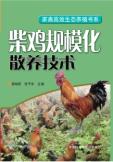
主要责任者: 杨柏萱,张予东
责任方式: 主编
出版者: 河南科学技术出版社
出版地: 郑州
字数: 127 千字
页码: 1-159
中图分类号: S831.4
语种:中
定价:15.00
出版时间:2012-08
丛书多卷书否:是
丛书名:家禽高效生态养殖书系
书目简介:本册工具书是家禽高效生态养殖书系之一,共收录27条词条。
| 词条 | 柴鸡规模化散养技术 |
| 类别 | 中文百科知识 |
| 释义 |  主要责任者: 杨柏萱,张予东 责任方式: 主编 出版者: 河南科学技术出版社 出版地: 郑州 字数: 127 千字 页码: 1-159 中图分类号: S831.4 语种:中 定价:15.00 出版时间:2012-08 丛书多卷书否:是 丛书名:家禽高效生态养殖书系 书目简介:本册工具书是家禽高效生态养殖书系之一,共收录27条词条。 |
| 随便看 |
开放百科全书收录579518条英语、德语、日语等多语种百科知识,基本涵盖了大多数领域的百科知识,是一部内容自由、开放的电子版国际百科全书。